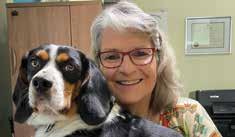
6 minute read
Estates and Personal Planning in Real Life
PERSONAL & ESTATE PLANNING Estates and Personal Planning in Real Life
BC Notary Lilián Cazacu, MA, PhDc,
MJur, BCL, Langley and Aldergrove Estate Planning is more than just
writing your Will. The majority of my Wills clients approach me with one request: “I just need a simple Will.” As many of my Notary colleagues may attest, there is no such thing as a simple Will.
While family dynamics may vary from home to home, and some situations may require a more or less straightforward Will and estate plan, most people require forwardthinking discussions and an analysis of their family dynamics, their assets and liabilities, and even the goals and dreams that may affect the way they would ideally plan their estate distribution.
I’m still amazed by how people invest so much time and resources into their financial planning, by researching and planning extensively, where and how to invest their money, but when they approach estate planning, they’re looking for a “pill” to give them peace of mind for the time being.
A good homemade meal requires considerably more preparation time than your favourite fast-food. Similarly, a proper estate plan requires some intentional planning from the clients and the Notary practitioner.
Having a quick Will prepared could give you some peace of mind, but won’t provide you with a bullet-proof estate plan that will cover all the bases.
For example, when I get involved in preparing an estate plan, I tend to spend at least 30 minutes with my clients to understand their values, aspirations, family status, financial situation, and so on, even before discussing any details regarding their Wills.
To make sure someone has all their “ducks in a row,” their estate plan should include all the areas of their life, such as accounting, investing, tax, and family-relationships dynamics. My approach in preparing our clients’ estate plan is to work in tandem with the clients’ other professionals such as their accountant, tax advisor, financial planner, and lawyer, so the estate plan accomplishes the clients’ goals from all those points of view.
I’m very passionate about solving challenging estate puzzles and rarely find an estate plan to be a straightforward solution. Moreover, instead of seeing “Will-making” as a one-time solution to all the estate planning needs, I prefer to look at an estate plan as a beautiful, diverse puzzle where the Will and Power of Attorney documents are just pieces of the big picture that is comprised of various day-to-day decisions, such as the way they decide to register their names on the title of their home.
Therefore, our final product is a custom-made, thorough estate plan that ultimately accomplishes our clients’ goals, such as helping protect their estate from any future legal battles or family discord, save taxes if that is possible, and even mend their struggling family relationships.
Ken and Gabriela P. (Lilián’s clients)
“We became a ‘blended’ family 31 years ago. Finances were tight so we arranged a very simple Will through a volunteer service offered by a local church.
“Our five children are grown and married and have children of their own. Our eldest passed, leaving a widow and daughter. Our financial planner encouraged us to update our legal documents. Consequently, we met with BC Notary Lilián Cazacu.
“We had a great in-depth assessment of our situation at Lilián’s office before proceeding to the drafting of any documents. Eventually, the division of our estate was tax-efficient and according to our specific situation. That could not have been achieved with a quick Will-drafting or by one of the “DYI” Will kits.
“Since major financial assets are held jointly and pass to a surviving spouse, the share arrangement covered the eventuality of joint demise and describes disbursement of remaining assets to the surviving family members.
“While we are a very close-knit family, all those arrangements were made to preclude any future conflict among our children.
“Therefore throughout all this painless process, our goal of wise planning to minimize additional pain and stress upon our demise has been achieved! To that end, our Notary has provided necessary and crucial help.”

BC Notary Kathryn L. Battrum, BA, MA, MBA, Lake Country, with Farley
Barry and Doris knew a,bout the Variation Act clauses in WESA (Wills, Estates and Succession Act, [SBC 2009] and resented the fact that the Court could change their Wills
on terms it thought appropriate. They felt they didn’t need Wills because they didn’t have much and the Court could intervene, anyway. But once they understood the lengthy BC Supreme Court process for applying to be an Estate Administrator for intestate deaths, they agreed it was better for their loved ones if they died with a Will than without one.
Forty-five-year-old Luba was on edge when she entered the office with her ageing parents. They had “Make a Will” on their bucket list and wanted to clear it off. Luba was an only child and even the contemplation of her parents’ death brought her to tears. But listening to her parents get deeply involved with the Will interview process prompted her to compartmentalize her grief and get involved with their planning that featured her significantly as their personal representative, trustee, and sole beneficiary. Mandeep presented as a 40-ish woman who was well-established financially and professionally. She wanted to do a Will but did not have a relative in the world! Her parents were deceased and she had no siblings, spouse, or children.
Mandeep had decided to have a trust company be her executor. We talked about how trust companies cannot charge more than the standard 5 per cent executor fee but many also charge administrative fees for every transaction they facilitate, including property sales. She agreed she could broaden her thinking about who could do that task for her, and perhaps see if any of her trusted colleagues at work would consider being her executor. Adrienne and Andrew were in their early 80s. She was very wealthy, he less so. She wanted to leave him money to safeguard his accustomed lifestyle, but her strategic objective was to protect her legacy and ensure her wealth largely passed to her three daughters from her first marriage.
The ratio of women-to-men in Andrew’s age bracket in Kelowna is about 2:1. Adrienne worried that if she died first and left her estate under Andrew’s stewardship, he could be manipulated into another marriage; his new spouse (the “key risk”) would then take control of Adrienne’s money.
Adrienne’s current Will had set up a life estate and trust, which she felt could not defend against the key risk. I suggested an “Andrew Fund” (the “Fund”) to be administered by one of her daughters in collaboration with Andrew. Adrienne liked that idea but was concerned that if the Fund should grow over time, it would be a target for the key risk. Ultimately I believe she will leave three quarters of her money to her daughters and have the daughter who is executor receive and manage the fourth quarter as an “unofficial fund” for Andrew on a monthly basis until he dies. Thus Adrienne’s wealth would not be visible to anyone else. s
Building brighter futures starts with people like you.
Did you know the majority of EFry's child and family support programs are made possible thanks to our donors? Please join us in giving mothers the personalized help they need to build healthy, stable lives for themselves and their children.
You can help. Visit: efry.com/donate-now











